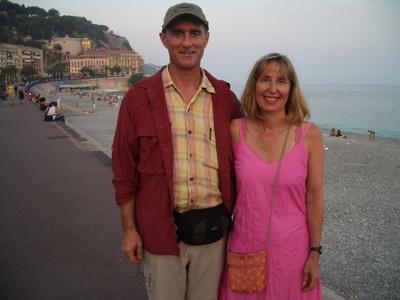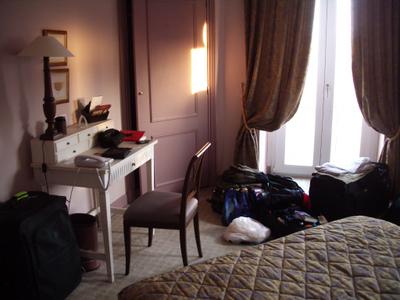Memories at a Distance
The Fourth of July is a big weekend in Belle Fourche, S.D., the small town on the edge of the Black Hills where I grew up. It is the time when people return and see their classmates from years past. A carnival comes to town, there is a parade, a rodeo, and fireworks out at the reservoir dam. My older sister Deb once told me that the Fourth is her favorite holiday.
My Dad’s older brother gave him a half-acre of land from his farm, where Dad built the house that he and Mom lived in for the rest of his life. After Dad died, Mom lived there a year and then moved into a duplex in town, to be closer to other people. She never recovered from my father’s death. She never came alive again. And on the Fourth of July weekend only a year or two after she moved to the duplex, my family gathered to dismantle the house as my older sister flew Mom to Nebraska where she would be placed in an assisted living facility close to two of her children. My focus that day was on getting everything sorted and moved—what would go to Mom and what would go other places. We worked hard and by the evening we had it all decided. The year we closed up Mom’s house, none of us went to any of the Fourth of July festivities in Belle Fourche, and I haven’t been back for a Fourth of July celebration since.
That weekend when we left town, I was full of worries about my Mom. A woman who was used to moving quickly and organizing all the teachers and students in the middle and junior high school was now unable to follow a simple recipe or make responsible decisions about putting on a coat because it was cold outside. The assisted living and the new location in Nebraska were not her idea at all. We knew she wanted to stay in her town, to be close to what was familiar, but none of us lived close enough for that to work.
Long before I was born, Determans lived in Belle Fourche. It had always felt like our place. Mom’s relatives lived in the surrounding towns, but Determans lived in Belle Fourche. The night we finished packing up Mom’s house, I remember thinking, “Now there are no Determans here.” It sounds so silly, but I felt as though I had lost something quite precious—my home, my town, my place in the world where I had always belonged.
The next two years were busy for all of us, dealing with Mom’s long illness. There wasn’t time to think of home! We returned to Belle Fourche for her funeral, to place her next to Dad under the big tree at the cemetery. I noticed none us stayed in town—we all by silent consent stayed in hotels in other towns in the Black Hills. I visit my parents’ graves whenever I’m in the area, but I don’t ever seem to have time to go into town. I don’t think of the 4th of July celebrations the same way now. I have no desire to go to the parade, the reunion, or the fireworks. The only way I can manage to even think of them is from a distance.
This year they will be celebrating my 25th reunion from high school. I was class president junior and senior years. School was important to me, but I won’t be at the reunion. We’ve just returned from France, and only with a huge effort could I be in Belle Fourche for the Fourth… Instead, we’ll be in Denver. Maybe I’ll call my sister and reminisce about lighting fireworks in the driveway with Dad. It seems easiest to remember the good times from a distance. At this point, if I went back to Belle Fourche, I feel sure that memory of the sad times would overwhelm memories of the good.
As I write this at Twin Gables, Len’s cousins Gail and Bruce are setting up their mother’s room at an assisted living home. It’s been a long journey getting to a decision on what is best for their mother, whose condition has similarities to my Mom’s but is also different. It seems so strange that they are moving her on the same Fourth of July holiday that we moved Mom to Nebraska.
I want to say to Gail and Bruce, Be gentle with yourselves, with each other, and with your Mom. The regrets you will have later will be connected to how you treat each other now. This is so difficult, and yet there is great satisfaction in knowing that you did the best you could, and that even though it didn’t seem nearly enough at the time, it was just right.
I’m happy to be at the beach. It feels calm and uncomplicated. I’m happy to be with Will and Lois, Len’s parents. Over time we’ve learned to appreciate each other. Being around them feels familiar, especially at the beach. I just want to watch them and take in their presence, impressions to be filed away and brought out like favorite treasures at times when I need to remember.
Maybe loss is a gift. It makes me look at today. I am here, and it is good. Life is fragile—that is what seems to make it so important.
Friday, July 01, 2005
A Taste of Maine
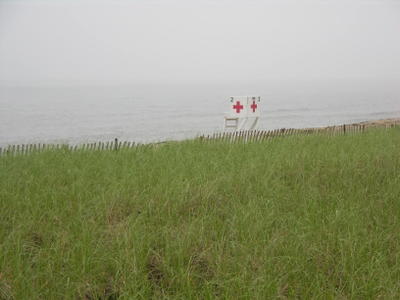
From here, in the dining room of my parent’s second home on the coast of Maine, we can look out toward France. But which end of the horizon should I be gazing at? I don’t know my latitudes well enough to be sure. The horizon is vague this morning, a blurred line of fog and gray sea not far off shore.
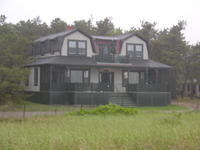
We drove up last night in a rented Altima and are now waiting for Mom and Dad to arrive in the Volvo wagon with Mary, their Welsh terrier, and a cargo of plants which my mother potted in Cambridge for the cottage. I had lobster salad for breakfast, with orange juice and a chocolate cookie. My heart leapt to find an unopened bag of Green Mountain light roast coffee, ready to fuel my writing time before Darlene woke up. I smoked my weekly Malboro out under the roof of the front porch, watching the rain make circles on the worn wood, listening to Michel Leeb in my ear buds singing songs of Paris.
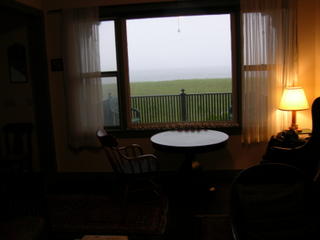 This taste of Maine makes me glad we will return here for the month of August, living next door in the Hooper Cottage, part of the family compound. Fifi is at the other end of the dining room table, writing her second entry for the blog. Léonard is feeling vague, savoring images of France as they give way to beach grass, a lifeguard’s stand. and the play of light from windows and an old lamp.
This taste of Maine makes me glad we will return here for the month of August, living next door in the Hooper Cottage, part of the family compound. Fifi is at the other end of the dining room table, writing her second entry for the blog. Léonard is feeling vague, savoring images of France as they give way to beach grass, a lifeguard’s stand. and the play of light from windows and an old lamp.
Darlene Joins the Blog
When I was in France – the language was the barrier that stopped me from visiting with people. If only I could ask, “Which peaches are the sweetest?” Or, “How do you prepare this fish?” I’d smile and say, “Je voudrais une tomato…” or whatever, and hope that they didn’t ask me a question. I felt on edge, apprehensive. I would ask, “Combien ça coute?” and then look intently at them as they spoke the price, never being able to understand what they were saying well enough to produce the exact amount. But I usually understood enough to hand them a bill of enough Euros that they could give me change.
I love the markets, les marches, the bustle, the colors of the fruits and vegetables and flowers lined up on the tables. The smells! It is probably my favorite part of France! Why couldn’t I get a vocabulary of enough phrases to help me speak in the market?
My fear froze my mind, and nothing could get in or out. Even after three months, when I’d go into a store and the salesperson would approach me, I could rarely spit out, “Je regard, c’est tout.” (I’m just looking.) Because I couldn’t speak French correctly, I oftentimes didn’t even want to look, I was so afraid of not being able to understand or respond correctly.
“Correctly” seems to be the big PROBLEM!. In my mind I had set a standard and if I couldn’t perform at that level, then I was unacceptable. There wasn’t any way to work with what I did know. It was never enough. That and my panic—I panicked in class when asked a question, and I panicked in real life when spoken to, when I desperately wanted to say something to someone and couldn’t find the words.
My panic took all the pleasure out of the situation! I couldn’t look the person in the eye! I couldn’t’ enjoy the moment. I could only try to get past the frozen fear of what? Of being afraid I couldn’t understand what was being said! Why was that so scary?
Maybe it was about being feeling lost. If I knew what was happening, I could make choices, but when I didn’t know what was being said, it was like being lost. And I have always been terrified of being lost! Once my older sister said to me, “Do you think something happened to us when we were young that made us so afraid of being lost?”
Mom used to tell a story of going camping at Yellowstone and how once she walked out of a different door of a restroom from the one she had entered, and then wandered for hours through the campground looking for my Dad! When she would tell the story she still looked scared, years later, and I can remember feeling scared hearing it. To this day, I never go into a restroom without tracing the route in my mind that I will take when I exit, to get safely back to where I came from! I feel as if I must be attentive, or I will become confused and make a wrong turn.
After struggling with old fears and my French for three months, I was surprised to see my reaction to a situation of confusion when we arrived in Boston yesterday. As I exited into the main terminal alone while Len was filling in a report for a missing bag, I passed through a door into a big semi-circle of people, some with signs, all waiting for people to arrive. I felt shy and on display. I quickly exited beyond the crowd, looking for the man from Boston Coach.
I could speak the language, but it felt more scary than being a non-French speaking person in France. A man at a desk looked like the most likely person to ask for help, but it took me five minutes to get the courage to speak to him. He was very abrupt and unfriendly to the person ahead of me. I was as afraid speaking to him as I was in France, but this was a language I knew—or was it? Yes, I knew the words for, “Can you tell me where I would look for Boston Coach?” And I certainly could understand his answer, “Across the street and to your left.” But I couldn’t understand the tone of his voice, except that it was impatient. In France I often felt like visiting with the people around me, wishing I spoke their language so I could talk to them. But at the airport yesterday, I had no desire to talk to anyone, to ask who they were waiting for, even though I knew their language. It seemed as if it was easier to connect with people when I didn’t know their language than it was back in my own country.
As I write this, I wonder—how do you get rid of fear? Where does it come from? Am I carrying fear that my parents had? Will I always carry it? My fear was a much more dominating part of my experience in France than my lack of French. I see it so clearly now! Today I’m at Len’s parents’ home in Cambridge, a place that has become familiar to me over the years, but this is still a different country from my own.
Today the fear kicks in, and I wonder what will be asked of me that I won’t know how to do CORRECTLY. The knot in my stomach tightens, and I am back in class the first month of French school, listening to the teacher speak and not understanding one word she is saying….
Thursday, June 30, 2005
Of all the Roads...
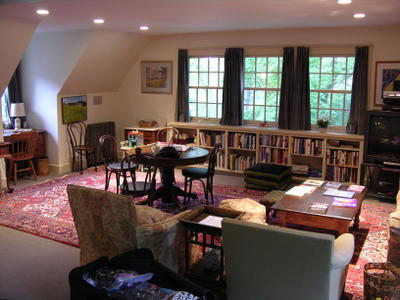 The living room in the 3rd-floor apartment where we are staying at my parents' home in Cambridge
The living room in the 3rd-floor apartment where we are staying at my parents' home in Cambridge-----------------
Cambridge, Massachusetts, U.S.A.
My mother last night in her kitchen took a Polaroid of Darlene and me, purposefully positioning us in front of a sampler that hung for years in her mother’s kitchen than reads, “Of all the roads both east and west, the one that leads to home is best.” Earlier in the evening, during a light supper in the kitchen, Dad talked about his favorite blog postings from France. He has been perhaps my most active and engaged reader, and in truth, I probably have him in mind more than any other reader when I write. My blog, among its other purposes, is a way for a New England son to speak openly to his father, through the bizarre vehicle of an intimate journal viewable anywhere in the world.
But my mother’s gentle probing last night was not about the blog. It was about home. “Even animals have a place they know is home,” she began when she and I were sitting at the table and Darlene and Dad were bringing plates in from the pantry. I knew exactly which nerve she was approaching, and I wasn’t ready to have it hit after a jet-lagged day of travel. “I know there is a point here somewhere, I just don’t know what it is,” I said, laughing, cutting her off. But that wasn’t true. I knew her point was to question our emerging manner of life, which comprises so much travel that it calls into question any traditional sense of where home is. By the end of this year, Darlene and I will have spent nearly six months away from Denver. As we lay over here in Cambridge for a few days before the flight home Saturday night, the whole concept of home is bugging me.
My parents know where they will be buried. It is a family plot on a hillside in Sudbury, Massachusetts, overlooking the Unitarian church where they were married. They grew up in the same town, and except for brief corporate interludes in Rochester, New York, and Pampa, Texas, they have lived within 20 miles of that hillside for more than 70 years. I moved to Wyoming when I was 30 years old and lived in Casper with Darlene for 20 years before very early retirement led to our move to downtown Denver and nearly a decade of increasingly frequent and far-flung travel. Darlene’s parents lived for most of their lives in the Black Hills of South Dakota. They are buried beside each other under a big pine tree in the Belle Fourche cemetery less than two miles from the church where they were married. The cemetery has a flock of wild turkeys that moves slowly among the graves.
In France I began a morning practice of reading a chapter from 100 Mots Pour Construire Son Bonheur (100 Words for Creating Well-Being) by Robert Misrahi, a retired philosopher from the Sorbonne. Today’s chapter, titled “Château,” is a serendipitous rumination this mother-lode of imagery for home, evoking the adage, “a man’s home is his castle.” The château evokes defense from enemies, beauty, celebrations of life events, and a life of sumptuous well-being and joy. But even the grandest château cannot, Misrahi writes, “échapper à la condition éphémère de la vie” (escape the ephemeral condition of life), and so he moves on to the “château intériere,” a phrase from saint Théresa of Avila. This interior château is of my own making. Here at a table in the third-floor apartment of my parent’s home, writing with my yellow Lamy pen, reading a book I’ve brought here from France, I feel a momentary sense of home—strong, safe, happy, and mine.
Darlene’s account of her fears in France makes me think of all the moving around I did as a child, from Sudbury to Texas, to Cohasset, Massachusetts, to Wayland. At the age of seven, my first night in our new home in Wayland, I told my parents, “This is a beautiful house. We won’t have any trouble selling this one.” My comment horrified them, and we lived in that house until I left for college. But my fear, felt in France in greater relief, is that I am not at home anyplace. That I have no home. That there is no road that will take me home. This is a feeling of being lost and vulnerable that seems of a similar nature to Darlene’s.
I was terrified to invite her into the blog. Now I’m sure it was a great idea. We are perhaps creating a new home “here,” in our shared willingness to create something new from our travels--our joys AND our fears.
Blink
 Hotel Mercure Marché aux Fleurs,
Hotel Mercure Marché aux Fleurs,Quai des États-Unis, Nice
We’re ending our time in France where it began three months ago, at a little hotel on the grand promenade facing the ocean in Nice. Darlene says, “I’ve learned a lot about France, I’ve learned some French. I’ve learned some things about myself, and I’ve learned some things about my husband. It’s good to do these things, and if you can’t say it more elegantly than that, don’t say it.” It’s a running topic of discussion how this blog seldom comes close to reflecting her experience of any given day or event. I used to try harder to weave her impressions into the writing, but such effort seldom pleased either of us. So you can be sure that this account of the last three months has only glancing reflections of what she’s experienced. Sometime I’d like to try a dual blog, sort of a James Carville/Mary Matlin presentation of a trip. Despite our incredibly different interests and travel rhythms, this long trip has ended up satisfying us both in equal measure. To return to this same rocky beach and think back over two months of French school, a month of travels based in Cannes, and all the people we’ve met and visited, is to experience the kind of creepy way that time gets compressed into the blink of any eye. Who were those two Americans who showed up at this hotel three months ago, nervously preparing for French immersion? They had no idea what they were getting into. And now as they are leaving, it’s not much clearer. Three months have passed in a foreign country which day by day came to seem less foreign.
New Chez Nous
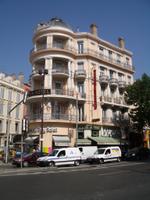 Hotel Cavendish, 11, Boulevard Carnot, Cannes
Hotel Cavendish, 11, Boulevard Carnot, CannesWe’ve moved across Boulevard Carnot for our last night in Cannes this trip, the better to leave Françoise’s apartment as wonderful as we found it a month ago. We spent today packing our bags, washing sheets and towels, and getting ready for the cleaning lady who will come tomorrow morning. With everything pretty much done, I made a wrong move as I began to haul one of the big suitcases out the door, and wrenched my knee badly enough to require the ice-pack treatment for a few hours. It’s still a little sore, but this looks like a mild version of prior knee events, which in the bad old days featured nasty dislocations and weeks of recovery.
The Cavendish is a grand old hotel, and we have a rounded room with a tiny balcony looking toward the Mediterranean. The hotel’s bagagiste helped Darlene bring the bags across the street from the apartment as I sat on the bed with my ice pack. I thought to post a photo of our room partly because I so enjoyed a photo of the Lord Nelson Hotel by fellow Denver blogger Matthew Saunders, who is on vacation in Nova Scotia.
It’s hard to imagine that our three-month sojourn in France is nearly over, and that we were wearing warm coats when we arrived, at the end of March. We have been moving around so much that it takes very little time for a space to feel like home. Tonight, it’s room 430 at the Cavendish, with air conditioning, a deep tub for Darlene, and a kicking wi-fi connection. But real home is starting to beckon strongly, and in less than a week we will be reacquainting ourselves with the mile-high version of chez nous au Colorado.

Monday, June 27, 2005
Another Nice Connection

Thanks to a tip from my friend Jean-Marie Jacquème, I was standing at a table of books this afternoon at the 10th annual Festival du Livre de Nice when I heard a voice ask me, “Avez-vous de la peur des robots?” (Are you afraid of robots?) I looked up from the books and saw a man seated behind them, smiling at me with an impish grin. I had to ask him to repeat the question, and I understood it the second time, replying, “Oui, un peu.” (Yes, a little). Thus began a fascinating conversation with Dr. André Varenne, a cardiologist who after retirement at age 65 began writing and publishing books. His most recent volume is titled Le Défi Des Robots Pensants: Nos amis ou nos assassins? (The Challenge of Thinking Robots: Our Friends or Our Assassins?) He became interested in the topic of robots, but unlike most of us, his interest was not idle; it led to extended research, writing periods which his very young and attractive wife told me sometimes last 12 hours straight, and an impressive tome of 236 pages, including 12 pages of detailed bibliography.
We visited for quite a while in French, and of course I bought the book. Doctor Varenne inscribed it as follows: “Pour Léonard, un américain qui parle mieux le français que les robots.” (For Leonard, an American who speaks French better than the robots.)
I wandered off, not wanting to monopolize his time for selling and autographing books, but I couldn’t help stopping by again. This time he told me about another of the books on the table, a book his father, Joseph Varenne, wrote about his experiences in World War I. Joseph kept an illustrated journal during his war years. As the second World War loomed, Joseph felt compelled to publish his journal in book form, as a warning to a new generation on the horrors of war. The book, titled L’aube Ensanglantée, (Bloody or Cruel Dawn) – has an introduction by Dr. Vareene, who said he hopes his grandchildren will do the same favor for him, republishing his books someday to keep them in circulation.
Although I had promised Darlene that I would not be buying any more books, I had to buy the father’s book, too. But my credit card wouldn’t work for some reason, and I had to search out an ATM across the Promenade d’Anglais, returning with cash for the purchase. It was well worth the effort. The doctor and I shook hands, and his wife took a photo of us, awkwardly stretching across the table for an embrace. Afterward, Darlene and I found a café near the Promenade and read for a couple of hours before taking the train back to Cannes. The robots book so far is stunning. It begins with a weirdly prescient play written in Czechoslovakia in 1920 by Karel Capek, titled R.U.R., Rossum’s Universal Robots.
Sometimes I wish I had started writing poetry and other creative literature earlier than age 45. But Dr. André Varenne of Nice has given me a wonderful model of the truth that it’s never too late to follow your deepest interests. And early on in the robots book, he slips in this clue to his energy and captivating grin. “L’humour n’est-il pas la plus philosophique des façons de vivre?” Or, “Humor, is it not the most philosophic way to live?” Oui!



